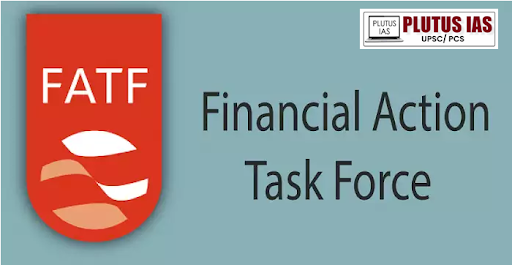23 Sep PRELIMS BITS: The Financial Action Task Force (FATF)
PRELIMS BITS: The Financial Action Task Force (FATF)
WHY IN THE NEWS?
FATF warns India of serious threat from ISIS and Al-Qaeda-linked groups active in Jammu and Kashmir.

Key Facts about FATF:
The FATF is an intergovernmental organization aimed at combating money laundering and terrorist financing.
Establishment: FATF was established in 1989 by the G7 to combat money laundering and terrorist financing.
Membership: Comprises 39 member countries and organizations, including the European Commission and the Gulf Cooperation Council.
Headquarters: The FATF Secretariat is hosted by the OECD in Paris, though they operate as separate entities.
Objective: Aims to develop policies to combat money laundering, terrorist financing, and other threats to the integrity of the international financial system.
Recommendations: FATF has developed a set of 40 recommendations that countries are encouraged to implement to combat money laundering and terrorist financing.
Mutual Evaluations: Conducts peer reviews of member countries to assess their compliance with FATF standards and recommendations.
Grey List and Black List: Countries that do not meet FATF standards may be placed on the grey list (under increased monitoring) or black list (non-cooperative jurisdictions).
Global Influence: FATF’s guidelines influence the policies of countries and international organizations, promoting a unified approach to combating financial crime.
Regular Meetings: Hold plenary meetings three times a year to discuss progress and emerging issues in global financial crime.
Public Awareness: FATF works to raise awareness of money laundering and terrorist financing risks and encourages public and private sector engagement.
Emerging Threats: Continuously updates its strategies to address new and evolving financial crime threats, including cybercrime and virtual currencies.
India and the Financial Action Task Force (FATF)
Membership: India has been an active participant in the Financial Action Task Force (FATF) since it became a member in 2010. The FATF is an intergovernmental organization aimed at combating money laundering and terrorist financing.
Commitment to Compliance: India has shown commitment to implementing FATF standards and has undertaken various measures to strengthen its legal and regulatory frameworks against money laundering and terrorist financing.
Action Plans: India has developed action plans to address deficiencies identified by the FATF, focusing on enhancing its financial systems, improving law enforcement capabilities, and ensuring better inter-agency coordination.
Regional Cooperation: As part of its engagement with the FATF, India collaborates with neighboring countries and regional organizations to combat financial crimes, recognizing the importance of a cooperative approach to security.
Advocacy for Global Standards: India has actively advocated for robust international standards to address the challenges of money laundering and terrorism financing, aligning its policies with FATF recommendations.
Challenges and Progress: Despite its efforts, India faces challenges related to domestic enforcement, the need for greater regulatory compliance, and addressing vulnerabilities in its financial systems.
Ongoing Monitoring: India is subject to ongoing monitoring by the FATF, with the organization assessing its progress in implementing necessary reforms to combat financial crimes.
Download plutus ias current affairs eng med 23rd Sep 2024
Prelims question:
Q. With reference to the Financial Action Task Force (FATF) Consider the following statement:
1. The FATF was set up by the G20 Group in 2010
2. India is the founding member of the FATF
3. Myanmar is the only country on the black list of the FATF.
How many of the above-given statements are correct?
A. Only one
B. Only two
C. All three
D. None
ANSWER: D




No Comments